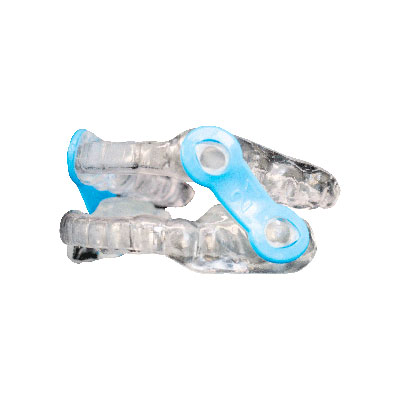
OSA Oral Appliance Therapy
Dental Sleep Medicine in Macon, Georgia
Dr. Leigh Bennett has completed additional training in dental sleep medicine and obstructive sleep apnea (OSA), a serious health condition that causes the body to stop breathing repeatedly during sleep. She also provides preliminary OSA screenings and reviews a Sleep Apnea Quiz with her patients as part of routine dental care at her Macon dental practice, Hartley Bridge Family Dentistry.
If you or a loved one are experiencing signs and symptoms of obstructive sleep apnea, Dr. Bennett will refer you to your primary care doctor or a sleep specialist for evaluation.
Your doctor may recommend that you spend the night at a sleep study facility for OSA testing. A sleep study records how many times a patient stops breathing during sleep, along with measuring oxygen levels and other indicators of heart, lung and brain health.
Learn more about how Sleep Apnea is diagnosed.
Your physician will develop a sleep health plan if a diagnosis of OSA is confirmed. The OSA treatment plan may include a prescription for oral appliance therapy to assist with sleep breathing as an alternative to CPAP (Continuous Positive Airway Pressure).
Learn more about Obstructive Sleep Apnea and Snoring:
How does oral appliance therapy (OAT) for obstructive sleep apnea work?
As the name implies, Obstructive Sleep Apnea occurs during sleep when the airway becomes blocked and the patient stops breathing. This generally occurs as the body enters deep sleep; the relaxed soft tissues in the upper airway and mouth lose firmness to the degree that they collapse and block the airway. When this happens, the OSA patient stops breathing for several seconds until the body wakes up with a loud gasp and begins to breathe again.
Although snoring may be related to other health issues, chronic, loud snoring can also be a sign of partial airway obstruction due to overly relaxed soft tissues.


Images courtesy of True Function Laboratory
Oral sleep appliances resemble removable dental mouth trays; they are made of durable medical plastic or a combination of plastic and metal. An oral sleep appliance is designed to support and stabilize the upper airway soft tissues to prevent partial or complete blockage.
Most OSA oral appliances are set to position the lower jaw (mandible) forward to keep the airway open. If the tongue is contributing to the blockage, the device can also be adapted to prevent this from happening.
If you have been referred to Dr. Leigh Bennett for oral appliance therapy for treatment of obstructive sleep apnea, here's what to expect:
- During your initial consultation, Dr. Bennett will meet with you to discuss your medical history and the sleep physician's findings. She will examine your teeth, tongue and oral soft tissues to design a sleep appliance that is customized to fit your bite and support improved air flow during sleep.
- Dr. Bennett will send instructions to our dental laboratory to fabricate your sleep appliance. After it arrives, she will see you again to review how to use and care for the appliance.
- Dr. Bennett and your sleep specialist will see you periodically to adjust (or titrate) the oral sleep appliance based on the results of follow-up sleep studies or home sleep tests.
Oral Appliance Therapy for Obstructive Sleep Apnea
Dr. Leigh Bennett has dedicated our Macon healthcare facility to serve patients struggling with TMD and obstructive sleep apnea CPAP intolerance. Contact Hartley Bridge TMJ & Dental Sleep Center if you have questions about oral appliance therapy for OSA.
